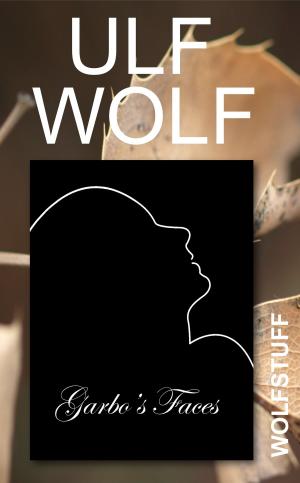| Author: | Ulf Wolf | ISBN: | 9781311145536 |
| Publisher: | Ulf Wolf | Publication: | June 12, 2016 |
| Imprint: | Smashwords Edition | Language: | English |
| Author: | Ulf Wolf |
| ISBN: | 9781311145536 |
| Publisher: | Ulf Wolf |
| Publication: | June 12, 2016 |
| Imprint: | Smashwords Edition |
| Language: | English |
He had a nose to scare children. It was half a large punctured pear, red and pockmarked. He was bald but for a grayish sprinkling along the sides and back of his head: almost, but not quite, monkish. He had the brow of a sperm whale. He could often be heard mumbling to himself. He was not underweight. He was considered strange.
But he did have the kindest eyes—doglike, wet.
He lived three flights up in the elevator-less building on the corner of Madison and Hoover. It was a five-story apartment house owned by ghosts and managed by equally invisible and unreachable proxy. Who, in turn, worked through other heartless proxy when rents were due or overdue or so overdue that evictions took place.
His building was a friendless one. Of twenty tenants only two were close. Only five knew each other by name. All in all, his building housed a collection of strangers who had only two things in common: the payee on their rent checks and they all considered him strange.
His fingers were clean, pink sausages. His lips were near blue but quite full. Most of the time he smelled of soap.
He puffed after the first flight of stairs, he had to stop and collect his breath on the second landing, and he was all but spent by the time he reached his brown apartment door where the bronze letters 3A (which he polished now and then) greeted him. He wore a vest and always kept the apartment key in its left hand pocket, attached to a thin but strong silver chain. He always knew where to find the key as he always wore the vest. He never locked himself out.
He rarely saw his neighbors. Occasionally he would hear a door slam and hear feet scrape across the dirty tile floor of his landing, and sometimes he would lean up against his door to press a squinting eye to the spy hole. What he mostly saw were backs or tops of heads proceed down the stairway leaving him embarrassed for having intruded on their owners’ privacy.
He cooked his own meals except for Fridays when he ate one large dinner serving of roast beef and two baked potatoes at Zimmy’s Restaurant between seven and eight regardless of the weather. He over-tipped.
“How was the roast tonight?”
“Oh, thanks. Wonderful, thanks,” he’d answer and smile at Cindy, the waitress his age but not of his planet. His voice was weak, feminine. He did not look at her, but somewhere to her right, taking her in peripherally. Eye to eye would be confrontational and not very kind.
He did not own a television set. The radio was his next best friend. Silence was his best friend. He spent hours every day in his silent living room reclined in a large, beige arm chair where he leaned his head against the darker than beige head rest, greasy from years of listening, wrapping the silence around him like an old, loved blanket. Safe, listening.
Listening to the city outside—to the coughing of heat pipes inside.
To the rush of water as showers were taken here and toilets were flushed there (which always embarrassed him, both from a sense of propriety and from his own visits being ordeals).
He had a nose to scare children. It was half a large punctured pear, red and pockmarked. He was bald but for a grayish sprinkling along the sides and back of his head: almost, but not quite, monkish. He had the brow of a sperm whale. He could often be heard mumbling to himself. He was not underweight. He was considered strange.
But he did have the kindest eyes—doglike, wet.
He lived three flights up in the elevator-less building on the corner of Madison and Hoover. It was a five-story apartment house owned by ghosts and managed by equally invisible and unreachable proxy. Who, in turn, worked through other heartless proxy when rents were due or overdue or so overdue that evictions took place.
His building was a friendless one. Of twenty tenants only two were close. Only five knew each other by name. All in all, his building housed a collection of strangers who had only two things in common: the payee on their rent checks and they all considered him strange.
His fingers were clean, pink sausages. His lips were near blue but quite full. Most of the time he smelled of soap.
He puffed after the first flight of stairs, he had to stop and collect his breath on the second landing, and he was all but spent by the time he reached his brown apartment door where the bronze letters 3A (which he polished now and then) greeted him. He wore a vest and always kept the apartment key in its left hand pocket, attached to a thin but strong silver chain. He always knew where to find the key as he always wore the vest. He never locked himself out.
He rarely saw his neighbors. Occasionally he would hear a door slam and hear feet scrape across the dirty tile floor of his landing, and sometimes he would lean up against his door to press a squinting eye to the spy hole. What he mostly saw were backs or tops of heads proceed down the stairway leaving him embarrassed for having intruded on their owners’ privacy.
He cooked his own meals except for Fridays when he ate one large dinner serving of roast beef and two baked potatoes at Zimmy’s Restaurant between seven and eight regardless of the weather. He over-tipped.
“How was the roast tonight?”
“Oh, thanks. Wonderful, thanks,” he’d answer and smile at Cindy, the waitress his age but not of his planet. His voice was weak, feminine. He did not look at her, but somewhere to her right, taking her in peripherally. Eye to eye would be confrontational and not very kind.
He did not own a television set. The radio was his next best friend. Silence was his best friend. He spent hours every day in his silent living room reclined in a large, beige arm chair where he leaned his head against the darker than beige head rest, greasy from years of listening, wrapping the silence around him like an old, loved blanket. Safe, listening.
Listening to the city outside—to the coughing of heat pipes inside.
To the rush of water as showers were taken here and toilets were flushed there (which always embarrassed him, both from a sense of propriety and from his own visits being ordeals).















